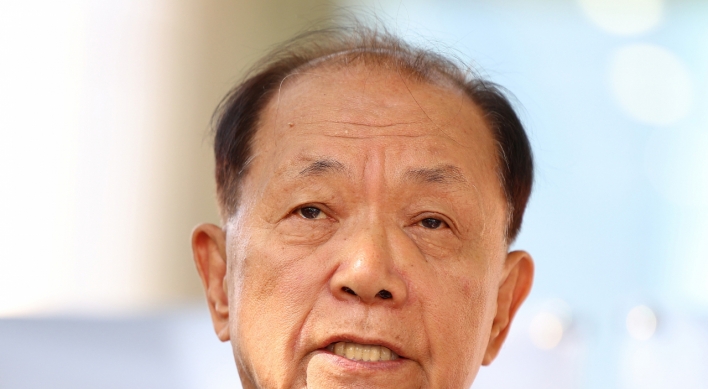South Korean President Park Geun-hye met with the foreign ministers of China and Japan on Saturday, an official said, amid fresh tensions mainly over a U.S. anti-missile system.
Park met with Wang Yi from China and Fumio Kishida from Japan for more than 30 minutes, the official said. South Korean Foreign Minister Yun Byung-se also attended the meeting at the presidential office.
Details of the meeting were not immediately available.
The meeting came amid tensions in the region over a U.S. missile-defense system that Washington hopes to deploy to South Korea, as well as history and territorial rows.
The three top diplomats were to hold a trilateral meeting at a Seoul hotel later in the day, the first meeting of its kind since late 2012. History and territorial rows have prevented them from getting together.
A trilateral meeting could potentially pave the way for a summit among leaders of South Korea, China and Japan, though it remains unclear whether the three top diplomats will produce any breakthrough.
In November, Park floated the idea of resuming a regular trilateral summit, which has been put on hold since May 2012 due to tensions between South Korea and Japan and between China and Japan over territorial and other history-related issues.
The meeting came as South Korea is struggling to walk a diplomatic tightrope between the U.S., Seoul's key ally, and China, Seoul's largest trading partner, over a U.S. missile system, called the Terminal High-Altitude Area Defense (THAAD) battery that is designed to shoot down ballistic missiles in their terminal stage.
Washington hopes to deploy THAAD in South Korea to counter ballistic missile threats posed by North Korea, saying it is a purely defensive system.
Still, China has repeatedly expressed its opposition to the possible deployment of a THAAD battery in South Korea, suspecting it is part of U.S. attempts to contain a rising China.
South Korea is also caught in the middle between the U.S. and China over whether to join a new regional bank led by China meant to fund infrastructure projects in Asia.
Many experts see the Asian Infrastructure Investment Bank (AIIB) as a counterbalance to the Asian Development Bank and the World Bank, which have been dominated by the U.S. and other Western economies.
The U.S. has said it is up to South Korea to decide whether to join the AIIB, though Washington has been negative about the Chinese push that is seen widely as an attempt to bolster its economic clout in Asia. (Yonhap)
Park met with Wang Yi from China and Fumio Kishida from Japan for more than 30 minutes, the official said. South Korean Foreign Minister Yun Byung-se also attended the meeting at the presidential office.
Details of the meeting were not immediately available.
The meeting came amid tensions in the region over a U.S. missile-defense system that Washington hopes to deploy to South Korea, as well as history and territorial rows.
The three top diplomats were to hold a trilateral meeting at a Seoul hotel later in the day, the first meeting of its kind since late 2012. History and territorial rows have prevented them from getting together.
A trilateral meeting could potentially pave the way for a summit among leaders of South Korea, China and Japan, though it remains unclear whether the three top diplomats will produce any breakthrough.
In November, Park floated the idea of resuming a regular trilateral summit, which has been put on hold since May 2012 due to tensions between South Korea and Japan and between China and Japan over territorial and other history-related issues.
The meeting came as South Korea is struggling to walk a diplomatic tightrope between the U.S., Seoul's key ally, and China, Seoul's largest trading partner, over a U.S. missile system, called the Terminal High-Altitude Area Defense (THAAD) battery that is designed to shoot down ballistic missiles in their terminal stage.
Washington hopes to deploy THAAD in South Korea to counter ballistic missile threats posed by North Korea, saying it is a purely defensive system.
Still, China has repeatedly expressed its opposition to the possible deployment of a THAAD battery in South Korea, suspecting it is part of U.S. attempts to contain a rising China.
South Korea is also caught in the middle between the U.S. and China over whether to join a new regional bank led by China meant to fund infrastructure projects in Asia.
Many experts see the Asian Infrastructure Investment Bank (AIIB) as a counterbalance to the Asian Development Bank and the World Bank, which have been dominated by the U.S. and other Western economies.
The U.S. has said it is up to South Korea to decide whether to join the AIIB, though Washington has been negative about the Chinese push that is seen widely as an attempt to bolster its economic clout in Asia. (Yonhap)







![[KH Explains] No more 'Michael' at Kakao Games](http://res.heraldm.com/phpwas/restmb_idxmake.php?idx=644&simg=/content/image/2024/04/28/20240428050183_0.jpg&u=20240428180321)










![[Herald Interview] Mistakes turn into blessings in street performance, director says](http://res.heraldm.com/phpwas/restmb_idxmake.php?idx=652&simg=/content/image/2024/04/28/20240428050150_0.jpg&u=20240428174656)
